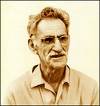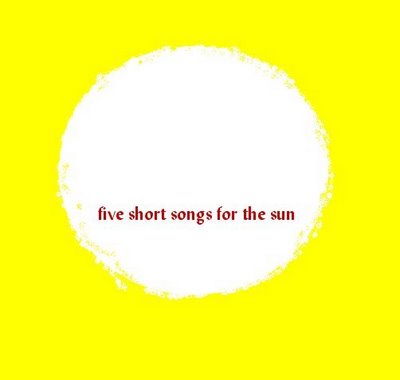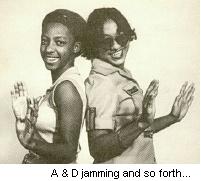Friday, July 28, 2006
don't look here, look over there
I've got an essay about Douglas Oliver up on Intercapillary Space, along with some fairly luminary company.
Also, I'm enjoying this gossipy treat.
Will do that Oppen thing over weekend (unless the beach proves too big a temptation)
Also, I'm enjoying this gossipy treat.
Will do that Oppen thing over weekend (unless the beach proves too big a temptation)
Friday, July 21, 2006
Oppen

George Oppen’s name kept on coming up. It took a while before I realised that this was because he’s just had one of those doorstopper complete poems issued by Carcanet. I didn’t know much about Oppen, apart from the fact that he’d given up writing poetry for twenty-odd years, the 40’s and 50’s, then started again without so much as a by-your-leave, and that he’d done this out of leftist political commitment, rather like Mark Stewart of the Pop Group giving up music to go and work for Amnesty. Because of this I’d stupidly imagined his poetry would be dry. I’m starting to realise quite late in life that lots of the things that are commonly supposed to act as dessicants on art (excess of theory, self-reflexivity, political commitment) in fact do nothing of the sort in the majority of cases. Anyway, Oppen was an Objectivist. Objectivism is a development of Imagism. Imagist poets (Pound, HD, Amy Lowell) were interested in cutting away the romantic flab from French Symbolism. They wrote poems of extreme visual clarity, in the belief that the poet’s visual image, conveyed with diamond-hard dry exactness and economy was the way out of the impasse of Romanticism. The emblematic imagist poem is Pound’s ‘In A Station of the Metro’:
The apparition of these faces in the crowd;That’s it. No room for mooning about in ruins or worrying about the past, it’s the twentieth century! Keep up! We’re the European Avant Garde! Objectivism comes soon after. Pound gave it his blessing, but really it’s centred around a few American poets who are all quite a bit younger than him: Louis Zukofsky, Charles Reznikoff, George Oppen, some others. They sought to take the extreme clarity of imagism a step further, to make it even more ‘pure’. Martin Stannard in his now defunct blog compared them to Dexy’s Midnight Runners in their passionate pursuit of committed and severe purity – a type of purity characterised by scepticism, terseness, an attention to the small, and a rigorous structural precision devoid entirely of loyalty to inherited form. This sort of thing is always slightly laughable, and certainly it takes a stern sort of fellow not to find the vast expanse of Louis Zukofsky’s ‘A’ (the ultimate get-around-to-it-one-day book) slightly comical. However, give them a break, try and imagine yourself in the complex 1930’s where the astringency of modernism is at once fresher and more bracing, but also newer and therefore much more fragile, lose-able, and it starts to come alive. A lot begins here. The chance operations of John Cage find themselves prefigured by Zukofsky. I see a lot of Oppen in Prynne. The Black Mountain lot and consequently the British Poetry Revival lot would be very different had these poets not ratcheted up the intellectual rigour in the way they did.
Petals on a wet, black bough.
Intellectual rigour, while not exactly the enemy of fun, certainly doesn’t figure on my list of party must-haves, and yet whilst Oppen ain’t exactly handing out funny hats and hooters, there’s a clear and powerful pleasure to be got from these tough little poems, and this big new Carcanet collected, which to be truthful I bought out of a sense of duty, can actually be read through in a way that some of these new giant tombstones honestly can’t. (I’ve resisted buying the Lee Harwood one – I think of lightness as a central attribute of his poetry and the unwieldyness of the book just doesn’t seem right. I’ll keep looking for the little press editions, thanks). A brief bio? Why not. Born into a wealthy family in New Rochelle NY, and always felt a bit responsible. His poetry often seems to be trying to shrive itself of something, to hand back an unearned share. Actually…I just went over to wikipedia to check something, and their entry on Oppen is pretty much unimpeachable, so if you want to know his life story, look here.
What I want to say, and I’m having to cut this short for time reasons, is that Oppen surprised me by being so lovely. I sort of thought it’d be stern, that it’d be a bit of a slog but good for me in the end. In fact, he’s absolutely bursting with great lines, full of the world, and full of a constantly refrained concern with multitudity (is that a word?) – something more specific than pluralism – an emphatic and lovely insistence that almost the central fact of humanity is numerousness. I’d excerpt some, but I’ve not got the book to hand. I’ll pick a few odd bits out and post them separately. Gotta go…
Tuesday, July 18, 2006
bird bird wolf wolf wolf

I'm not exactly busy, but I don't seem to have any time. I wonder if the heat may have buckled the day in the way it did the window frames of a newcastle train station causing sheets of glass to to cleave the gelid air and geordies quite in twain. Or at least fall harmlessly out, or possibly just loosen, but anyway...where was I? Hot, isn't it? I'm halfway through writing something about George Oppen, less than half way through the Oliver thing, about to start a new job which means committing to a 9-5 routine for almost the first time ever (about time, really), panicking slightly about how I'm going to do 2 (or more) people's jobs, and running out of clean clothes because it's too hot to bend down and put things in the washing machine. It was therefore with great delight that I gazed on the cool and plain onedit. Lots there, especially the wonderful Jeff Hilson's Bird Bird stuff. More of it here.
I'm doing a live event with the Brighton improvising guitar & drums trio Raised By Wolves soon, although I'm not entirely sure about the date. The something-teenth of August. For those who've never experienced RBW, get some here (scroll down), and imagine me shouting to be heard in the background.
Wednesday, July 12, 2006
old poems

The other day, when I was enthusing about Mayakovsky, I said I'd try and find some poems from about a year ago. It feels a bit of a cheat to be posting old stuff, but I did go over them and make some changes, so they're not entirely stale. Also I've not had much time for blogging of late as I've got a new (better) job (in the same place), so things are a bit busy here, and likely to stay so for a month or two. I'll do my best, though. I'm writing something on Douglas Oliver for intercapillary space - it should appear there some time around the beginning of August. Here're the poems I promised:
Five Short Songs For The Sun
city
what number the cheap jewels?
the pyroclastic flow of trash?
in dazzling screes banked high,
many millions, many millions.
such brilliantly encrusted streets
as are barely navigable by
vans, fluoro maze of great
variety, lights, many lights.
traffic churns up swarf, foil,
glittering mud, puddles,
is it star or day light? While
figures dwindle to single chimes,
die, eyes all but close,
here beneath the canopy
lime trees shade, wave, release
the sun's steel bulletin.
1892
day unlived; first of all, all days.
amanuensis to the nearby
newly dead, your brave hand
one inch above the escritoire
as the sun climbs
horses
parade in circles
in the anfiteatro
dust rises
in circles
your suite of rooms; vanilla,
dust. the newly dead. silence.
sun descends and
the horses are still
turning
by evening
you have drawn
only circles
roaring ovens of light
towpath
radio on the towpath
leicestershire that smells of
field drainage
muddy leachates
brackish and still
tilth flecked with tesserae
leicestershire in the sun and
is this sunlight full
as it seems again to be
of girls and women?
do they hover a little
above the stony earth?
and what are they singing?
trailing around in loose formations
singing: ramalama fa fa fa
rising and falling on the
doo wop thermals
in the sunlight
like that
I suppose they
must be
the backing singers
pool
I dive into the swimming pool
while David Hockney watches me
I wonder as the roaring light
unbrightens, foams and streams away
why seen from here, aslant, looking,
he is the sun's twin and sees
no shadow
and why I imagine
a valley floor, and
a circle of yellow horses
cantering and
a circle of yellow dust
rising, dry
the pool is full of questions today
I break the water
my bright hand
sun
up and to
the paddock
of light
to feed
the horses
of the sun
we feed them
grain honey
bletted medlars
they stamp on
hollow turf, turn,
walk severally away
sting hisses
this hot coin
covers our
branded
left eye
Tuesday, July 04, 2006
all about we

I recently re-read an interesting essay by Ken Edwards called Grasping the Plural, collected in Denise Riley’s critical anthology Poets On Writing. Ken’s essay is about the use of the first person plural in poetry. It reads this tendency as a danger, and marks the places where others have fallen or warned of traps. It’s obvious that poetry is almost exclusively always the product of a single writer. The few exceptions I can think of either properly fall into the category of editing (Pound and Eliot) or into the murky field of translation. Therefore it is odd that the speaking presence in a poem is so often figured as ‘we’. Once you start poking around in this stuff all kinds of interesting things come up. If I was more diligent and organised I’d write a proper essay on this, but you’re going to get nothing more than a list of unconnected thoughts. What are you going to do, fail me?
Is there an atavistic memory of bardic / shamanic tradition? Of someone being the group’s speaker-to-itself? Or a kind of delegate? You’d be tracing ideas of leadership, identity, all that stuff about the body of the king. Actually, whilst there clearly would be a one-standing-for-many or a many-speak-through-one phenomenon, it strikes me that the power of this subject would lie in its singularity, and that the 1PP (first person plural) would not figure in the texts I hypothesise. Anyone know? Ancient texts (eddas, and such) with a plural voice?
What about the ‘Royal We’? When does that date from? Anyone know?
Psalm 137 –‘…we hung our harps on the willows…’ That’s more it, isn’t it? And that’s exilic, pressure, displacement. The ‘we’ seem scattered in the psalm, sitting by the rivers (plural), a song about not singing, although it focuses in on the first person by the time you get to ‘my right hand forget her cunning’. There’s something odd about that, a dissonant shift that properly enacts the vicious tribal angst of that poem. It ends with them threatening to smash their enemies babies against stones. That’s what we will do. It has a subtly different moral force.
Blake’s Jerusalem as anthem– unusual in that it is first person, where most are second. Is that why it appeals to dissenting types like me? Because we don’t have to sing ‘we’? We don’t have to be part of a congregation, even if we’re part of a choir? Like old Blake himself who’d as soon’ve burned his burin as crept about in a church.
Other things I suspect are relevant:
Whitman – ‘I contain multitudes’
George Oppen ‘Of Being Numerous’
Althea & Donna – Uptown Top Rankin. “See me in mi ‘alter back” – they both sing, going double. Doppelganging.
Anyway I’m supposed to be preparing for an important interview on Wednesday, so will leave it at that for now. More thoughts on pronouns soon. Can’t wait, eh?